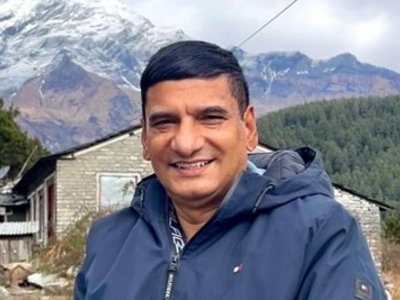

Madhu Sudan Acharya's cooperation with Austrian universities started in 2004 with a North-South scholarship (financed by the Austrian Development Cooperation). During his PhD studies at the University of Natural Resources and Life Sciences (BOKU), he conducted research on "Sustainable Management of Roadside Slopes in Nepal". After completing his PhD in 2007, he returned to Nepal and rejoined the government service as a Senior Divisional Engineer at the Department of Roads under the Ministry of Physical Planning and Transport, Government of Nepal. Then, in 2012, being interested in doing postdoctoral research, he applied for the position of university assistant at BOKU. He worked as a university assistant at BOKU for six years and returned to Nepal in 2018, joining Tribhuvan University. Now he is working as a visiting professor at Tri-Chandra Multiple Campus, Department of Geology. Every year, about 25 master’s students complete their master’s degree in engineering geology. He teaches these students to pass on his knowledge and skills to the next generations.
In November 2019, together with the Department of Geology, Tri-Chandra College, he applied for a research project under the OeAD programme Cooperation Development Research (Kooperation Entwicklungsforschung – KoEF). This programme provides financial support to establish and strengthen research cooperation between universities/research institutes in Austria and universities/research institutes in countries of the Global South.
The KoEF project is concerned with the use of green and sustainable technology to mitigate rainfall induced natural disasters such as landslides and floods. The proposed research project will explore the possibility of widespread use of an innovative, sustainable and environmentally friendly green slope and riverbank protection system in developing countries. A slope protection system based on semi-flexible steel mats and soil nails has been developed in Austria and has been used for a long time in Europe, but this technology has not been tested in Nepal, where there is great potential for it. The increasing number of natural disasters calls for further research into the application of this technology in a different geological environment and socio-economic context. He also promotes nature-based engineering solutions such as vegetated bamboo crib walls and soil bioengineering for landslide and flood protection.
Publication References:
https://scholar.google.com/citations?view_op=list_works&hl=en&hl=en&user=lOudTs4AAAAJ
Personal and Professional Impact:
Madhu Sudan Acharya's PhD also led him to a university assistant position, which was a major milestone in his career. He is currently working as a visiting professor and geotechnical expert at the Department of Roads, Ministry of Physical Planning and Infrastructure, Government of Nepal.
Living and working in Austria for many years helped him to expand the academic network and bridge the research gap between developed and developing countries. He had several opportunities to work in different EU-funded research projects, government organisations and universities, which helped him to explore the new areas of research and the research needs of different stakeholders. The OeAD scholarship was very supportive for his career development. The PhD itself changed his horizon and broadened his vision of scientific research. After the PhD, he was promoted to a senior position with new responsibilities.
However, at the beginning of his PhD studies in Austria, he faced some challenges such as communicating with people. It was sometimes very difficult to understand the German and the lectures of different professors with different dialects. Similar problems arose when buying and eating food due to different eating habits. Of course, while he was in Austria, he missed his parents and the festivals that are celebrated in his home country.
After completing his studies in 2007, he returned to Nepal in 2008 and rejoined the government service as a Senior Divisional Engineer at the Department of Roads under the Ministry of Physical Planning and Transport, Government of Nepal. His exposure to European development has greatly influenced my planning and design of development projects. His way of thinking had changed a lot and he was very successful in implementing development projects in Nepal. His family and children were also able to stay in Austria and get a good education. He was also very successful in networking with different universities in Europe and on board.
Dr Madhu Sudan ACHARYA received his PhD (Doctor rerum naturalium technicarum - Dr.nat.techn.) from the University of Natural Resources and Applied Life Sciences (BOKU), Vienna, in 2007. After completing his PhD, he returned to Nepal and worked in the government service as a Senior Divisional Engineer at the Department of Roads under the Ministry of Physical Planning and Transport, Government of Nepal. Between 2012 and 2018, he returned to BOKU as a University Assistant (post-doctoral researcher). He is currently working as a Visiting Professor at Tri-Chandra Multiple College, Tribhuvan University, Kathmandu, Nepal. He is also working as an Individual Consultant (Geotechnical Expert) to the Department of Roads.
He is working in his field to further strengthen the existing academic and scientific network between Austria and Nepal through more research collaborations. He intends to continue working as a visiting professor at Tribhuvan University in Kathmandu and will try to establish and strengthen the academic network between Austria and Nepal. If possible, he will try to have a regular academic exchange programme and joint thesis supervision for Master and PhD students.
